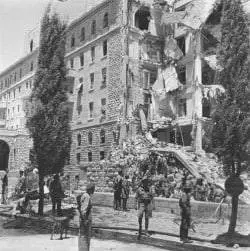
In 1946 the simmering tension in British occupied Palestine literally exploded when Jewish terrorists blew up the King David Hotel killing 91 people.
Pat Rowe’s new play Jerusalem Tango uses the intertwined stories of two people dancing in the hotel on that day to explore the impact of the British mandate coming to an end, which is when the conflict we are so familiar with today began.
“It’s about a love affair between a Jewish Palestinian woman and an English officer. It’s a little like Romeo and Juliet, and it’s about tango, terror and passion,” says director Olivia Rowe in a break from rehearsals at The Carriageworks.
“The whole story is about these ideological differences, and it’s all about the very human consequences, the individual lives that all come together at the moment of the bomb, but they come from very different places.
“I think it’s about how when you’re dealing with people who are very passionate about what they are doing, and that passion extends into other parts of their lives. You have these two sides of the coin, where they are very passionate about blowing up the British, and her having a relationship with a British man.
“No-one comes out of this period looking great, and I think the thing I like about the play is that it is two characters who fall in love and betray each other. They also betray their own sides, which is not that far away from what their broader societies were doing either. It humanises for me the real politic.”
Pat Rowe wanted to tell the story of the bloody end of a 30 year period where the British recreated their colonial life in a troubled country with traditions utterly alien to their own. But for a play set over a half a century ago the play has eerie parallels to the present day’s never ending turf war.
“There’s a lot of parallels with the current British position in Iraq and Afghanistan, where you have these green zones handling the administrative side of their work, and that is very much like the administrative centre of the British Mandate in a hotel in the centre of Jerusalem.
“The hotel was closely guarded and there was this attack on it, and everyone was very shocked by it, so there’s quite a lot debate whether we should be there or whether we should let them get on with it. Other people were going oh no, because if we leave then they will just kill each other, and we’re doing something good.”
Pat Rowe has based her work on real people, changing names and fictionalising lives, but the star crossed lovers express their love via the dance craze of the time.
“Tango was really like our pop music, with a beat that everyone understood, and people really did used to go and tango in the bars of the King David. All sorts of people did, people involved in the Mandate and those who weren’t, it was a really glamorous thing to do.
“Tango was a form of expression used throughout the 1930 and 40s, there were quite a few tango pieces by concentration camp survivors called tangele, which is literally song of tango or little tango. They were used as a form of protest or expression of pain.
“Watching the actors do it I can see where the glamour and passion comes from, it’s incredibly life enhancing being swirled around, and it feels very intimate with the person you are doing it with.
“The dance links all the people to together because dance is universal and dance is the most sophisticated form of entertainment, and the most savage.”
As the two sides in today’s conflict edge painfully slowly to a peace deal Jerusalem Tango is an opportunity to reflect on the intense terrorist campaign launched by men who would later become mainstream political leaders in Israel.
“One person’s freedom fighter is another person’s terrorist and they killed 91 people and it was a massive deal. I know we’ve had the Town Towers, and the numbers have got bigger, but they blew them up.
“It wasn’t ‘oh whoops’, they set the changes and there was a warning call but it wasn’t done in a way they could clear the hotel.
“ But I think for me theatre is first and foremost about telling a bloody good story and it should be brilliant, life affirming and fun. I hope people will come and really enjoy it, but that it also just gently makes them think and have a look at some prejudices that they didn’t even know they had.
“Are the lovers betraying each other or falling in love? Maybe people’s views won’t shift, but at least they will think about it.”
* Jerusalem Tango is on at The Carriageworks from May 1 to May 26 and tickets can be booked on Tel: 0113 224 3801 or email [email protected].